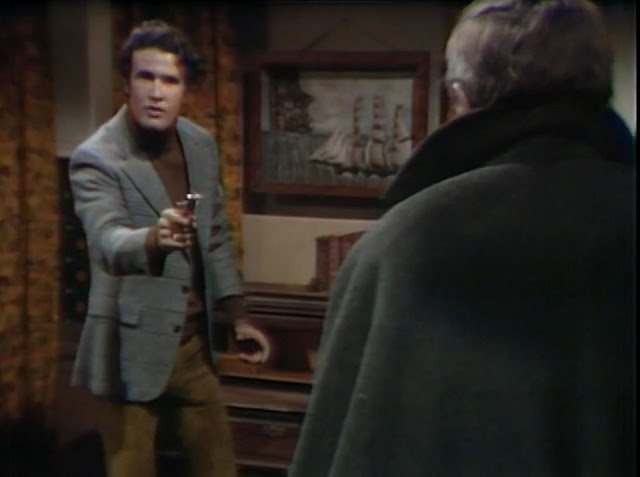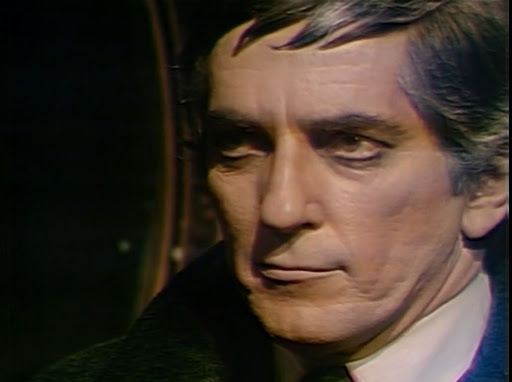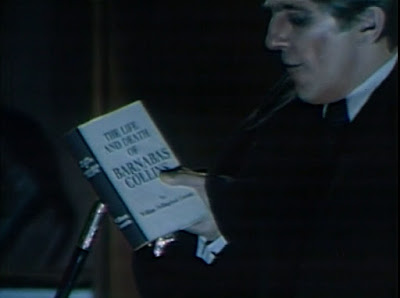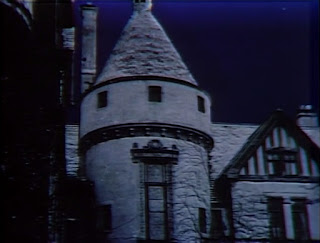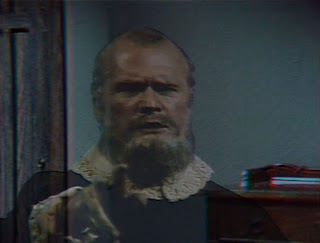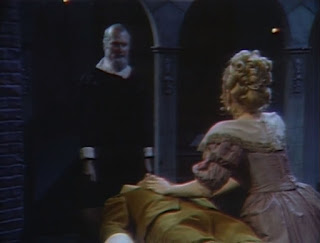By PATRICK McCRAY
Be careful what you wish for, Barnabas. You just might get it when the Parallel Time room takes you on a one-way trip into another dimension. Sky Rumson: Geoffrey Scott. (Repeat; 30 min.)
A desperate Sky Rumson's gambit fails. In the effort, Jeb plunges off Widow's Hill, Carolyn plunges into depression, and Barnabas forces Sky to shoot himself. With the danger passed, Barnabas is no longer distracted from the desperate pangs of bloodlust. In a last ditch hope that the rules will be different for him in Parallel Time, Barnabas explores the mysterious portal once more and finds himself trapped there.
Have you ever had the experience of watching a scene on the show, finding it well-acted and dramatically compelling, about matters that are absolutely crucial to the characters, but when it was all over, you'll be damned if you can remember what happened? It seemed like something was happening. Everyone was behaving as if something were happening. And yet, turn the corner, and you're still at Worthington Hall. Masters of that particular medium are forced to do what I can only call a form of Zen anti-writing. Everything has to matter. Everything has to have dramatic dynamism. But it must be limited to as little real growth as possible.
And it has to happen in a medium designed to be both constantly compelling and yet accessible by audiences who can't afford to be excessively distracted. They’ve got ham salad to grind out by 5:30 and still have to give the kids a shot or two of benadryl before you-know-who gets home. Okay, you can't say that nothing happens. But what was it, exactly? This strange chemistry is the reason that we can’t stop watching a soap opera once it begins resonating with us. Why is it so familiar? That unlikely fusion of constant tension wrapped up in the frustrating amber of inertia resembles daily life closer than any form of art that comes to mind. Even Dark Shadows. Maybe, especially Dark Shadows. We spend weeks and months waiting for some sort of inevitable change. When it happens, as it does in “reality,” it transpires with a blink-punishing swiftness. It's always satisfying, and yet, it never quite lives up to our expectations. Sometimes, it’s better. In fact, it often shames the impulse of having expectations by exceeding them while falling just short enough to keep us watching. Characters on soap operas see The Resolution as the end of their problems. We know that they serve to usher in new ones. To writers and producers, they represent opportunities. And for the writers and producers of Dark Shadows, they represent the possibility to electrify the culture, itself. The saturation of Barnabas and Quentin into the zeitgeist proves my point. Creating them created inadvertent cultural power for the producers. And with that came the pressure to sustain it. To top it. To remain on the cultural vanguard. And, through the injection of novelty, often through novel actors, shield themselves from the power of performers to see themselves as indispensable. Everything after Barnabas, it’s safe to say, was an attempt to re-create that success. It’s easy to evaluate that success or failure based on how storylines resolve themselves, if they ever even do. I think it’s more interesting to look at beginnings and wonder about the aspirations within.Few transitions are as dramatic as this one. Ultimately, few will be as strangely permanent. Sky Rumson is gone. Barnabas doesn't even bother to bite him. Even if he enslaved Rumson as his blood-bound servant, he wouldn’t exactly be a familiar worth bragging about. Sky would probably knock on Barnabas' coffin multiple times a day. Asking for a glass of water or warning him that they sent a new milkman.
Letting go of Sky Rumson‘s small potatoes; we must concede that Jeb is gone as well. It's not like the show didn't give the character a fair shake. His storyline kept going even after the primary threat presented by it was over for weeks. As much as they tried, Jeb never took off like Quentin or Barnabas. I sincerely wonder what Dark Shadows would have looked like if Jeb had been as popular as the Collins cousins. Would they have needed Parallel Time to cover shooting the movie? Could they have afforded to go at all?
From a certain perspective, PT is the boldest and most awkwardly optimistic piece of storytelling on the show, designed to please fans while taking away all of the characters with enough saturation to carry an unprecedented feature film. But what if it were potentially more?
I have every confidence that the production team looked at Jeb with hope. After two years of dizzying success, was anything outside the realm of possibility? And if not Jeb, then Parallel Time. Yes, they had every reason to believe that Parallel Time could be a success, also. Why not? They had already done it once. In so many ways, 1897 is a Parallel Time story. It reflects a number of the earlier, more successful plot elements of the classic period but with the confidence and swagger of a show that knows what it's doing. Dark Shadows could have easily continued in 1897, and although everyone would be curious about the events taking place in the present, they were hardly bereft of pure DS entertainment. Among other things, it's Dark Shadows the way it could have been, had Dan Curtis known what he could get away with. After the mixed reception of the Leviathan arc, perhaps the team wondered if they should have stayed with the better mousetrap of 1897. Perhaps this upcoming storyline is a way to correct the mistake, if only metaphorically.It feels as if the writers are yet again playing their own Monday morning quarterbacks by recreating the show based on even more of what has defined success. This means leaving something behind. The prospect of a successful introduction to Parallel Time explains a number of the more controversial choices of the movie. What kind of film kills off most of its major characters? Maybe one that is preparing audiences for the idea that Dark Shadows can continue without those characters. Obviously, the film universe and the television universe are two separate things, so we are speaking symbolically, not literally. Imagine that Parallel Time had been a roaring success. By the film’s release, the franchise would stand redefined. Could Parallel Time have become the series’ new home? In a post-Vicki universe, anything is possible.
The potential success of PT was not in its novel concept. No one speaks of it in the same breath as “Mirror, Mirror.” Its strength simply lies in its freedom to rewrite the rules. But with tried and true elements that they had discovered, rather than as points of pre-production speculation.
David Selby is a success, so why not make him the head of the household? I would certainly tune in. Kathryn Leigh Scott can clearly do more than just pour coffee, so what if she becomes the Mistress of Collinwood… who is also a stranger? One who can view the mansion’s antics with the objectivity of an outsider. In other words, Victoria Winters on spiritual steroids. While Grayson Hall plays a tremendous best friend, she's too good as a villain to waste. So, let her do what she does best. At least, what she does best when not in Gypsy drag. And look at how much more capable and intelligent they allowed Willie Loomis to become. Well, Parallel Time allows for that, also. Rounding out the ensemble, you have an Angelique who is deservedly a point of attention for everyone, rather than The Other Woman. After all, they had seen exactly what Lara Parker could do, so why not make the spotlight even brighter? It may have been intended as more than a placeholder in the Dark Shadows saga. It feels like the a further refinement of marvelous elements they discovered while getting there. And, conveniently, you have your most popular character just waiting to be released.
Why consider this? None of this happened, of course. Parallel Time was not a Barnabas nor Quentin-level success. Neither were the Leviathans. But look at these storylines based on their potential as well as their delivery. Because at this point, it was all about potential. If you've never seen the show, this might be objectively evaluate valuated as the start of the next big thing. When it's not that, it gives the rest of us a greater reason to sit back and reflect on what really made Dark Shadows, at its best, work.

